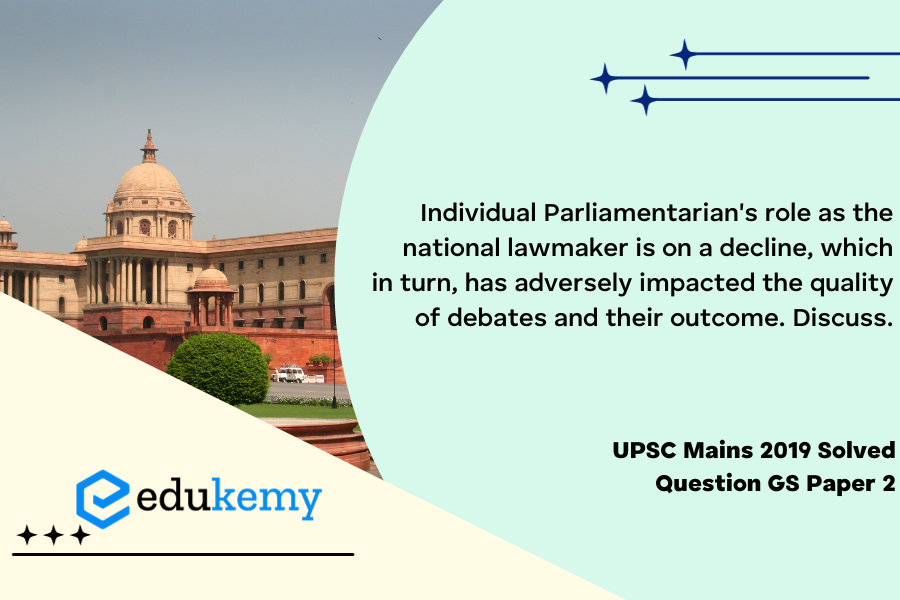The decline in the role of individual parliamentarians has direct consequences on the quality of debates within legislative settings. With lawmakers veering towards party lines rather than exercising independent judgment, the once vibrant exchange of ideas and diverse perspectives is giving way to a more monolithic and predictable discourse. Consequently, the depth of analysis and the exploration of nuanced solutions to complex issues have suffered. In addition, the diminished influence of individual parliamentarians has led to a decline in the accountability of legislative processes, as decisions are increasingly made within party caucuses rather than through transparent and inclusive debates on the floor. This trend not only stifles the democratic essence of parliamentary systems but also risks undermining the legitimacy of legislative outcomes. In conclusion, the waning role of individual parliamentarians as national lawmakers is a cause for concern, demanding a reevaluation of the factors contributing to this decline and a concerted effort to restore the vitality of individual contributions to legislative deliberations.
Tag: Parliament.
Contents
Decoding the Question:
- In the Introduction, try to write the role of Individual Parliamentarians.
- In Body, discuss the decline in the role of individual Parliamentarians and its adverse impacts.
- In Conclusion, try to suggest some measures to strengthen their role.
Answer:
The role of a Member of Parliament (MP) is a multi-functional one. They have different responsibilities and capabilities as the elected representative of an electorate, a Member of Parliament, and a Member of a particular political party (the exception being for Independents). In a representative democracy like India, the parliamentarians play an active community role and represent the aspirations and issues of the people.
The Decline in the Role of Individual Parliamentarians and its Impact:
- According to the ADR report, around 34% of the MPs in the 2014 Lok Sabha faced criminal charges, as compared with 30% in 2009 and 24% in 2004. This results in the criminalization of politics and unparliamentary behavior.
- Successful passing of a private member’s Bill is often perceived by many as incompetence on the part of the government and intrusion into the respective Ministry’s domain. If such legislation is seen getting support in Parliament, the government requests the MP to withdraw it and promises to introduce it as a Government Bill instead.
- Without support from the ruling party or a party that commands the majority, it becomes impossible to pass a private member’s Bill, especially in the Lok Sabha.
- There has also been a shift to law-making by ordinance, which completely bypasses the formal route of debate and discussions. E.g., the promulgation of the Muslim Women (Protection of Rights on Marriage) Ordinance, 2018.
- Even individual parliamentarians are obliged to toe the party line, through regulatory frameworks like the Anti-Defection Act. This discourages any deviation from the party decision and takes out the possibility of diverse perspectives that parliamentarians as individuals can offer.
- Quality of the elected Individual Parliamentarians also affect the quality of debate and discussions in the house. According to the Association for Democratic Reforms’ report (2014), 30% of sitting MPs and MLAs were facing some form of criminal proceedings, and only 0.5% were convicted of criminal charges in a court of law.
- Currently, a large part of the voting population views their representatives as their problem solvers. So they are willing to vote for a candidate who can get things done ignoring his involvement in a crime.

Measures to Strengthen Role of Individual Parliamentarians:
- A strict code of conduct should be implemented for ensuring attendance and regulating the good behavior of parliamentarians.
- The Law Commission 170th report suggested that the Anti-defection law should be applied only to confidence and no-confidence motions or only when the government is in danger.
- Individual MPs and MLAs should be empowered to think independently to represent the people.
- The Election Commission should be empowered to check the role of muscle and money power in the elections.
- It is also imperative to bring in electoral-political reforms to free MPs from the growing autocratic structure of political parties.
- There is a need to introduce intra-party democracy in the selection process of candidates to tackle the problem of dynasty, wealth, and power.
However, apart from paying respect and giving encouragement to the legislation framed by the Individual Parliamentarians, several other issues also need to be addressed to improve the overall quality of discussions in the Indian Parliament and in governance in India. For eg, Members of Parliament have to address their low attendance and increase their engagement in the discussions. Similarly, they have to utilise the limited parliamentary time for proceedings judiciously without unnecessary disruption. Unless the polity becomes more transparent, responsible, and bipartisan in our actions, the trust of the public in institutions cannot be ensured, and the Parliament will only fade further, ultimately weakening the foundation of our democracy.
In case you still have your doubts, contact us on 9811333901.
For UPSC Prelims Resources, Click here
For Daily Updates and Study Material:
Join our Telegram Channel – Edukemy for IAS
- 1. Learn through Videos – here
- 2. Be Exam Ready by Practicing Daily MCQs – here
- 3. Daily Newsletter – Get all your Current Affairs Covered – here
- 4. Mains Answer Writing Practice – here


